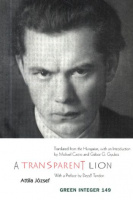categories
- Traffic and Vehicles Catalogue
- socreal.catalog
- Advertisement Catalogue
- Photo Catalogue
- Chinese and Japanese Catalogue
- New Holy Card Catalogue II.
- 12 interesting old books
 Books
Books
 Bibliophil
Bibliophil
 Antiques
Antiques
 Engraving
Engraving
 Maps
Maps
 Photos
Photos
 Antique Papers, Small Prints
Antique Papers, Small Prints
 Posters
Posters
- Circus
- Modern Graphics
- Socialist Realism
- NER Propaganda
- Others
cart
Cart is empty
You've not logged in
József Attila : A Transparent Lion
- description
- additional information
Translated from the Hungarian, with an Introduction by Michael Castro and Gyukics G. Gábor.
With a Preface by Tandori Dezsõ.
Regarded by many as Hungary's greatest twentieth-century poet, Atilla József was born in Budapest in 1905 and died, after apparently throwing himself under a train, in December of 1937.
József lived a difficult life marked by severe poverty, loneliness, and depression, paralleling the conditions of his native Hungary during an uncertain and turbulent period of the 20th century between the wars. Writing in intense emotional tones that swung between despair and hope, József invigorated old poetic forms with a new freedom, orchestrating his poems with fresh rhythmic patterns influenced by folk music's rhythms as well as their metrics. But József was also influenced by Dadaist and other modernist ideas sweeping Europe, finding a voice that would synthesize the older cultural forms of Hungary with the new experiments of his time.
With a Preface by Tandori Dezsõ.
Regarded by many as Hungary's greatest twentieth-century poet, Atilla József was born in Budapest in 1905 and died, after apparently throwing himself under a train, in December of 1937.
József lived a difficult life marked by severe poverty, loneliness, and depression, paralleling the conditions of his native Hungary during an uncertain and turbulent period of the 20th century between the wars. Writing in intense emotional tones that swung between despair and hope, József invigorated old poetic forms with a new freedom, orchestrating his poems with fresh rhythmic patterns influenced by folk music's rhythms as well as their metrics. But József was also influenced by Dadaist and other modernist ideas sweeping Europe, finding a voice that would synthesize the older cultural forms of Hungary with the new experiments of his time.
| condition: |      |
| category: | Books > Foreign Language Books > Books in English > |
| category: | Books > Literature > Poetry > |
| publisher: | Green Integer, 2006 |
| item number / ISBN: | 9781933382500 |
| binding: | paperback |
| pages: | 129 |
| language: | English |



























































 Telefon:
Telefon: E-mail:
E-mail:







